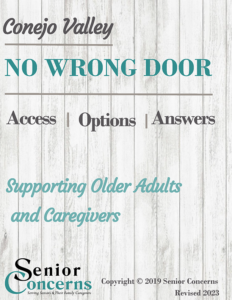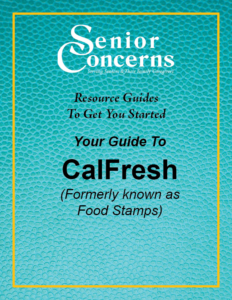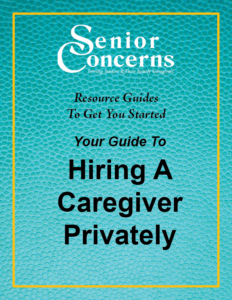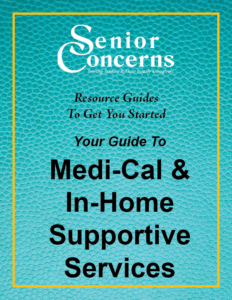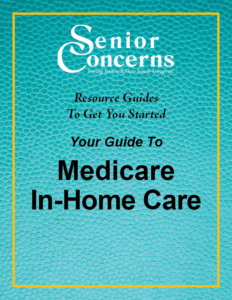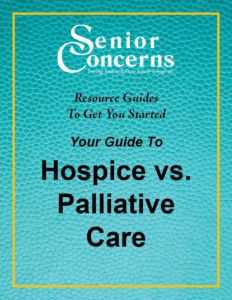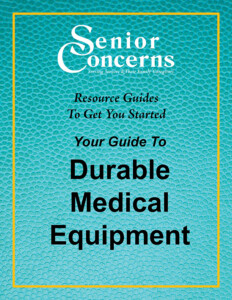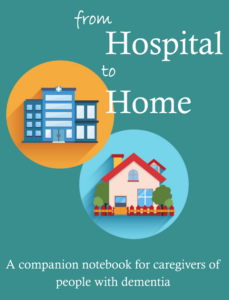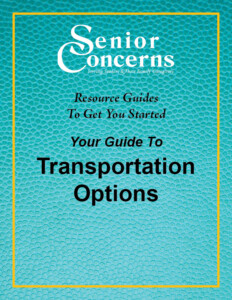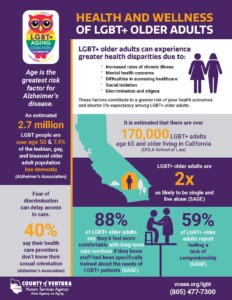Welcome to Senior Concerns’ Collection of Resources
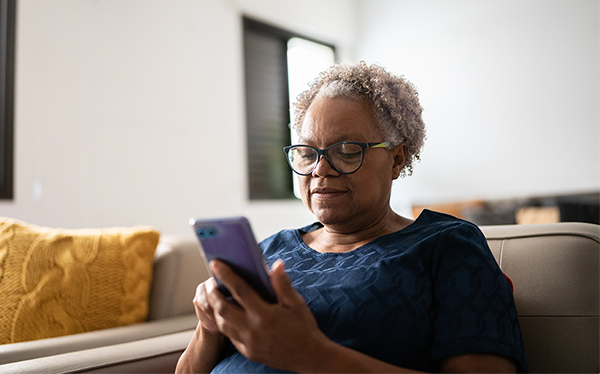
Senior Concerns has begun compiling a collection of downloadable resources for your use. These are starting points and guides to help you think through your needs.
However, the best resource is always talking to one of our trusted staff! Call us to talk through these resources so we can best guide you based on your individual needs.
We are just a phone call away! 805-497-0189
No Wrong Door
As your trusted guide to services for older adults and family caregivers, Senior Concerns staff knows how to navigate a wide-variety of community resources. This No Wrong Door guide demonstrates the many organizations and programs that our staff can help you understand, and what will best support you in your journey.
CalFresh is the California implementation of the federal Supplemental Nutrition Assistance Program, formerly known as the Food Stamp program, which provides financial assistance for purchasing food to low-income California residents.
Food Help Resources
There are a variety of resources to help people secure food for their households, including Food Pantries, Free Meal Sites, Home Delivered Meals and Shopping services. This overview includes website addresses and phone numbers.
What To Know If Hiring A Caregiver Privately
Hiring a caregiver is a beautiful thing to do for a loved one, but it also carries tremendous obligations and burdens because you have now become an employer. It is therefore imperative that you understand your legal obligations.
Download your PDF copy of Hiring A Caregiver Privately here.
Medi-Cal & In-Home Supportive Services
Medi-Cal is California’s Medicaid healthcare program that provides comprehensive health coverage for people with low or no income. IHSS is a program under Medi-Cal that can pay for help in the home. The Human Services Agency helps seniors with low incomes and people with disabilities (including children) stay in their own homes instead of moving to residential care facilities.
Download your PDF copy of Medi-Cal & In-Home Supportive Services here.
Medicare In-Home Care
Medicare does not typically cover most in-home care services unless they are deemed medically necessary and ordered by a doctor. Examples of covered services may include skilled nursing care, physical therapy, and occupational therapy. Medicare may also cover some medical equipment and supplies needed for in-home care.
Hospice Care vs. Palliative Care
Hospice and palliative care both include interdisciplinary teams that come to the home with the goal of providing comfort, stress reduction, and physical and psychosocial relief.
Durable Medical Equipment (DME)
Medicare will typically pay for medically necessary and prescribed DME to treat a medical condition. Some examples of DME covered by Medicare include: Crutches, wheelchairs, hospital beds, walkers, oxygen equipment, CPAP machines, blood glucose monitors, insulin pumps, nebulizers, traction equipment, scooters, prosthetics, urinary catheters.
A companion notebook for caregivers of people with dementia
Research indicates that people with Alzheimer’s disease and dementia have twice as many hospital stays per
year as other older people, requiring family caregivers to be able to effectively communicate with the healthcare team while their loved one is in the hospital, and understanding how to provide follow up care once the elder is transitioned to the home. More often than not, the patient with dementia is unable to effectively communicate their needs and wishes to hospital staff. The family caregiver becomes stressed trying to keep track of everything they need to tell the hospital staff to ensure their loved one is properly cared for.
To help open the lines of communication between family caregivers and hospital staff, and to help ensure the best possible transitions from hospital to home, grant funding has enabled Senior Concerns to develop the “From Hospital to Home: A companion notebook for caregivers of people with dementia.”
The Hospital to Home notebook provides a form called “All About Me” for the caregiver to fill out including information about the patient, how they best communicate, what can help when providing care. The caregiver can post this next to the bed to alert any person who enters the room about how to approach the patient.
The notebook not only provides practical information and resources for the caregiver including a medication log, home safety information, common challenges for people with dementia and a resource list, but it also teaches the caregiver how to be a patient advocate. The most important resource for any person with dementia is their caregiver. This notebook hopes to empower the caregiver to ask questions, to advocate for care and to create the best situation and experience for their loved one with dementia.
Download Ventura County Notebook
Descargar Condado De Ventura Cuaderno En Espanol
Individual Downloadable Pages:
Transportation Options
Several transportation options are available for seniors throughout the Conejo Valley.
LGBT+ Aging Coalition: Health and Wellness
Research reveals a number of crucial insights about the health and wellness of LGBT+ older adults.




